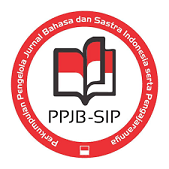IMPLIKATUR PERCAKAPAN PADA NASKAH MONOLOG SURAT KEPADA SETAN KARYA PUTU WIJAYA
DOI:
https://doi.org/10.23887/jjpbs.v7i2.11294Abstract
Penelitian ini bertujuan untuk mendeskripsikan (1) bentuk implikatur percakapan pada naskah monolog Surat kepada Setan karya Putu Wijaya (2) fungsi implikatur percakapan pada naskah monolog Surat kepada Setan karya Putu Wijaya dan (3) implikasi naskah monolog Surat kepada Setan karya Putu Wijaya terhadap situasi politik Indonesia. Jenis penelitian ini ialah deskriptif kualitatif. Subjek penelitian ini adalah naskah drama monolog Surat kepada Setan karya Putu Wijaya. Objek penelitian ini adalah bentuk dan fungsi implikatur percakapan Searle.Dari 46 tuturan pada naskah Surat kepada Setan, terdapat 25 tuturan yang mengandung implikatur percakapan. (1) Terdapat 16 tuturan yang berbentuk asertif, 4 tuturan direktif, 2 tuturan berbentuk komisif, 16 tuturan dengan bentuk ekspresif, dan 1 tuturan dengan bentuk deklaratif. (2) Fungsi implikatur percakapan yang diungkapkan oleh Searle pada naskah Surat kepada Setan sebagian besar berfungsi mengritik, mengeluh, berpendapat, menasihati, menawarkan, dan menetapkan sesuatu. Fungsi implikatur percakapan yang dominan pada naskah Surat kepada Setan karya Putu Wijaya ialah fungsi mengritik dan berpendapat. (3) Implikasi naskah Surat kepada Setan terhadap kondisi politik Indonesia menunjukkan sebuah pertanyaan tentang siapa setan dalam kehidupan bangsa dan bernegara. Implikasi yang ada pada naskah merupakan sebuah refleksi kepada pembaca maupun penontonnya. Hasil penelitian ini dapat dijadikan bahan pertimbangan ketika mencari maksud atau pesan sebuah karya sastra ketika akan dipentaskan. Selain itu, hasil penelitian ini direkomendasikan agar dijadikan salah satu bahan pembelajaran materi implikatur.Kata Kunci : implikatur percakapan, naskah monolog.
This research aimed to describe (1) the form of conversational implicatures on the monologue Surat kepada Setan by Putu Wijaya (2) the function of speech implicatures on the monologue Surat kepada Setan by Putu Wijaya and (3) the implications of the monologue Surat kepada Setan by Putu Wijaya on the Indonesian politics’ situation. The type of this research is qualitative descriptive. The subject of this research is the script of monologue drama Surat kepada Setan by Putu Wijaya. The object of this research is form and function of Searle conversational implicature. Data were collected by documentation method and interview. Of the 46 speech in the text of the Surat kepada Setan, there are 25 speeches that contain conversational implicatures. (1) There are 16 speeches in the form of assertive, 4 directive speeches, 2 commissive speeches, 16 speeches with expressive form, and 1 speech with a declarative form. (2) The function of speech implicatures disclosed by Searle on the Surat kepada Setan largely serves to criticize, complain, argue, advise, offer, and establish something. The dominant conversation implicature function of the Putu Wijaya Surat kepada Setan script is a criticizing and argument function. (3) The textual implications of the Surat kepada Setan on the political condition of Indonesia show a question of who the devil is in the life of the nation and the state and then of the text are a reflection to the reader as well as the audience. The result of this study can be taken into consideration when looking for the purpose or message of a literary work when it will be staged. In addition, the result of this study is recommended to be used as one material learning material implicature.
keyword : conversational implicatur, monologue script
Published
2017-07-26
Issue
Section
Articles
License
Authors who publish with the Jurnal Pendidikan Bahasa dan Sastra Indonesia Undiksha agree to the following terms:- Authors retain copyright and grant the journal the right of first publication with the work simultaneously licensed under a Creative Commons Attribution License (CC BY-SA 4.0) that allows others to share the work with an acknowledgment of the work's authorship and initial publication in this journal
- Authors are able to enter into separate, additional contractual arrangements for the non-exclusive distribution of the journal's published version of the work (e.g., post it to an institutional repository or publish it in a book), with an acknowledgment of its initial publication in this journal.
- Authors are permitted and encouraged to post their work online (e.g., in institutional repositories or on their website) prior to and during the submission process, as it can lead to productive exchanges, as well as earlier and greater citation of published work. (See The Effect of Open Access)







